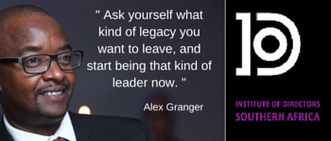|
As the FIFA scandal swirls into the firepool at Nkandla, and the Auditor-General reports another year of astronomical “fruitless and wasteful expenditure” by the country’s municipalities, the value of strong and ethical leadership becomes yet clearer. In business, too, it’s well established that the quality of an organisation’s leadership will affect its performance dramatically.
In other words, Alex Granger’s topic of Incredible Leadership was well-chosen for the lunch that followed the IoDSA’s recent AGM. Granger opened his presentation by observing that incredible leadership had to be credible. Leaders cannot just mouth fine words and sentiments—they have to embody them. Employees (and people generally) want to trust their leaders, but that trust has to be earned. Granger outlined some of the warning signs that an organisation’s leadership might be falling short of incredible. Among them he listed fear of facing up the challenges involved in fulfilling the organisation’s mandate, a lack of attention to detail, tension in the organisation, and a tendency to be reactive rather than proactive. Superman not needed He went on to identify some of the characteristics of the incredible leader. The first is that he or she should be “flawsome”; that is, both “awesome” and “flawed”. “Leaders need to be less ‘super’ and more ‘human’,” Granger said, noting that imperfect leaders attract loyalty. However, they do need to be consistent: what they say and what they do have to align. And while they need to recognise that they can’t (and shouldn’t) tell everybody everything, what they communicate should be truthful. Another important leadership quality is the ability (and willingness) to build personal relationships. This is the only way to build trustworthiness, and we can see all around us the lack of care and empathy shown by leaders, from the ward councillor living in a gated community to the union leader insulated from his constituents by a phalanx of guards. “If people are looked after well, they will look after the organisation,” Granger said. “Never forget the human element, and don’t treat your employees as assets to be maximised. They are people!” The benefits of incredible leadership are many. They include improved employee engagement, morale and retention—and thus better productivity. Organisations with incredible leaders find it easy to attract top talent, and they show high levels of innovation and creativity. Not surprisingly, they deliver higher levels of service to the most important people of all—the customers. “Ask yourself what kind of legacy you want to leave, and start being that kind of leader now,” Granger concluded. 5 qualities of an incredible leader · Be mindful. Pay particular attention to what’s going on without trying to come to conclusions or think of other things. · Serve others. Rather than becoming bosses, leaders should concentrate on empowering those whom they lead with the right tools they need to achieve greatness. · Cultivate courage. Leaders have to take the hard decisions and have the hard conversations. This mean exposing themselves to a certain degree of risk. It’s often not recognised that to be courageous you have to accept a certain vulnerability as well. · Be humble. The greatest leaders, those who inspire loyalty, are humble. They instinctively respect others, something they show by the way they talk to, and about, them. However, being humble does not mean being a doormat: leaders are humble and assertive at the same time. · Practise generosity. Being generous means more than financial rewards—although those are always nice. Leaders should be generous in all sorts of ways: ready to praise achievement, and to spend time listening to their followers, without imposing a solution ENDS MEDIA CONTACT: Cathlen Fourie, 012 664 2833, [email protected] For more information on the IoDSA please visit: Website: www.iodsa.co.za Twitter: @The_IoDSA LinkedIn: The Institute of Directors in Southern Africa group Comments are closed.
|
Archives
July 2024
Categories
All
|


 RSS Feed
RSS Feed